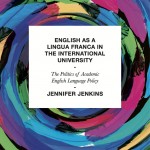-
Recent Posts
- CLLEAR seminar Friday 6th October: Prof Tania Ionin 26/09/2017
- TNS Workshop 6th July 19/06/2017
- CLLEAR Thurs 25th May @ 4pm: Prof Jennifer Smith and Dr Sophie Holmes-Elliot 22/05/2017
- CLLEAR Seminar Wednesday 17th May: Prof Alessandro Benati 11/05/2017
- CLLEAR Seminar Friday 5th May: Dr Neal Snape 27/04/2017
Archives
The ‘international university’ and English Medium Instruction
Universities around the world are increasingly identifying themselves as international. This involves, among other things, recruiting large numbers of students and, to a lesser extent, staff, from outside their own national borders, and using English as their primary lingua franca on campus, particularly as their medium of instruction.
The international university, and English Medium Instruction (EMI) have to date been under-researched, although more recently, interest in them has been growing. My own interest in the topic stemmed originally from my work in the field of Global Englishes and English as a Lingua Franca (ELF) in particular over the past twenty-five years, and focuses on issues relating to the use of ELF as the principal lingua franca of international higher education. I began my most recent research on the subject in 2010, when I embarked on a major project exploring English-related issues globally among university management and staff, and among international students in a UK university setting. The findings were published by Routledge in 2013 in my controversial monograph, English as a Lingua Franca in the International University: The politics of academic English language policy, the first major publication to explore the issues in such depth. As a result, I have been invited to talk about my findings and orientation to EMI/the international university around the world, especially in mainland Europe and East Asia, as well as in the UK (although not so far in my own university!).
My current research in the field of EMI focuses on three areas. With colleagues at King’s College London I am investigating a radical alternative to the native English-oriented English language entry tests (typically IELTS, TOEFL and PTE Academic) in which international students have to achieve certain scores in order to be admitted to international universities. I am also researching individually, firstly, international students’ perspectives on the PhD viva, and, secondly, staff orientations to international students in UK international universities. As well as this, as part of the 3-year Diamond Jubilee Fellowship that was awarded to Prof Anna Mauranen and me in 2013, we are carrying out an in-depth comparison of EMI at our respective universities. We have also invited colleagues at universities in China, Germany, and Japan to join us on this project.
Finally, in 2010 I became the founding director of the Centre for Global Englishes (CGE) at Southampton. While the staff and student members of CGE have a range of interests in Global Englishes, a substantial number have particular interests in EMI. Because of this, I am in the process of establishing an EMI group within CGE who will collaborate on projects including the Diamond Jubilee Fellowship research, so as to build a worldwide reputation for CGE at Southampton as a major site of research into EMI.
